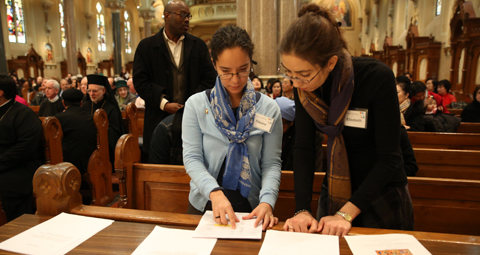August 17 | ![]() 0 COMMENTS
0 COMMENTS ![]() print
print

The challenges of what it means to be a disciple
The role of the laity is changing, leading to some tension in the Church — By Sally Fraser
I have come to the end of the first year in my new job as a pastoral associate in my parish. How has it been? Much harder than I thought. I mean, I thought it would be difficult, but not this difficult. As so often, many of the biggest obstacles have been, well, me. I thought I might need to confront the odd personal demon, not the entire legion. I thought I might need to let it break me a little bit, but not entirely. I suppose I thought that I could stay in control, one way or another. But I don’t think that’s the kind of relationship God is into operating with.
But whatever my own personal difficulties it was never going to be easy to try and carve out a roll when no-one was sure what it would or should entail, and not everyone even wanted to exist in the first place.
Parishes, I believe, have a habit of forming a microcosm of the bigger whole, and here as everywhere there can be a sense of there being no map, no obvious way forward, and an unease between those who would retreat backwards and those more comfortable with change. Here we have always had a lot of very dedicated lay volunteers, but not everyone welcomes someone in a paid role, or in any kind of leadership or more visible post.
“We were brought up to believe you should serve God and not accept any praise,” I have been pointedly told, along with the fact that my singing is too loud and my shoes are too noisy, or that a priest who died two decades ago said ‘That door must be kept shut.’
I shouldn’t be negative though—there have been surprising and amazing moments too. When visitors from other parishes came to our church for an ecumenical celebration they asked our parishioners ‘who was that nun who introduced the service,’ and were surprised when they were told, with smiles and some pride, ‘that’s not a nun, that’s Sally. She works here and this is the future.’
Such moments give a real boost through tougher times, but as everywhere we must not be too swept along by it, must innovate without trampling on the feelings of those who may feel frustrated resentful that they never had such opportunities to get involved in new initiatives, or who might be looking for more stability and routine from their church. And after decades of dedicated and often thankless service who can blame them?
But no one can sit through a church meeting without wondering if, when an upper room did our Lord prepare, he was instructed to leave it the way he found it. We must balance the excitement of mission with the steadiness of maintenance, must meter passion with practicality.
This tension is found elsewhere too. There is a clear appetite, not just in Edinburgh but in so many areas, for increased laity involvement in church life, of what Anne Burnham of the newly formed Scottish Laity Network refers to as ‘a world wide phenomenon of an educated laity,’ part of ‘healthy growth of the ever changing Church, reforming herself to become more like Christ’s vision of the mission we are all called to.’
But what that actually will look like? Well, as I said, there is no map and it might be scary and uncomfortable. The only thing that will get past the scariness is communication, conversation, dialogue.
My hope is that the conference planned for October in Edinburgh on the Church and laity will be a real coming together, with a possibility for different voices to be heard.
This polyphony could be creative and healing, because without it organisations and authorities will always have a tendency to be perceived as not listening and those in position of resistance will always feel misunderstood as the powerful struggle to understand the pain and frustration of feeling silenced.
Because after all, there is nothing new under the sun. There are always tables to be turned over, always Pharisees and scribes, always challenges to check one’s own eyes for logs.
Jesus always emerges as just as relevant in every single argument as he ever was, usually on both sides somewhere along the line, and just as controversial, if we let Him emerge that is.
Our task as always is to listen and be prepared to respond to Him in the creative passionate voices of resistance, or in the calming, more submissive voices urging us to know when to turn other cheeks too, or render unto Caesar. After all, our Church has stuck together for 2,000 years: tradition can be frustrating but it is its own kind of strength.
Trying to find this balance for myself personally, taming my own propensity for volatility while retaining my integrity, has been and is my ongoing challenge.
Studying has helped. I travel to England to train for a diploma in Pastoral Ministry with the Loyola Institute, Chigaco. It is a wonderful thing to be part of, a huge community of people all wanting to do more for the Church, even if they don’t know exactly what that ‘more’ might entail.
From veritable armies of trainee deacons, to pastoral council members, to youth leaders, we are being put through our paces, challenged to think about what it means to be a disciple, or to lead disciples. We are pummelled into immersing ourselves in scripture, trying to get ever closer to the God whose will we are clumsily trying to discern in our lives.
Discern our callings, our, dare we say it, vocations? Are we allowed to use those terms as lay people, married people, women? I believe that if we are it would go along way to soothing many of the tensions which run so high at times. My own prayer is simply that I would be open to whatever I am required to do.
One of the most powerful and helpful images I hold on to is the idea, which I believe comes from Richard Rohr, of the need to be mid-wives in the Church. This is so perfect, as it shows the worth of simply being with those in pain, the necessary pain of change and newness. The waiting, the uncertainty. The kind of skills needed, compassion, patience, wisdom. And even, as I think about it, the importance of avoiding fearfulness.
Because as those of us who have laboured know, fear is the enemy, it produces all the wrong hormones, sends everything backwards. It is love and affection that has the magic power to keep everything moving in the right direction, toward those moments of earth shattering joy and more peaceful marmalade on toast.
I feel blessed to be in a position to share my passion for the Church I believe in, and I hope it will be open to more and more people, that Catholicism doesn’t become a box that many of us just don’t feel we fit in. Because the world needs us and is, I believe, more than ever thirsting for us. And all sorts of voices need to come together for us to be the Church we want to see in the world, with our experiences, the mess of our lives, and the desires which spring from our own personal Faith journeys.











